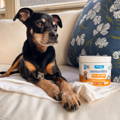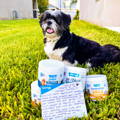Can Dogs Eat Peanut Butter? Everything You Need To Know
Vet Verified
WRITTEN BY DR. JOYA GRIFFIN
Jump to Section

It’s got a crowd-pleasing flavor, a delectably sticky-smooth texture, and a savory aroma dogs just can’t resist. Any guesses? As you might have suspected, we’re covering the holy grail of dog deliciousness: peanut butter!
Can dogs eat peanut butter and if so, how much? Is peanut butter good for dogs, or just another human food dogs can’t eat? Find out the basics of dog-safe peanut butter bliss so that your pet can enjoy the ingredient in their diet.
Can dogs eat peanut butter?
Can dogs have peanut butter? Yes––but only in moderation. Just like any other human food, peanuts and peanut butter have a few crucial rules to consider if you’re giving them to your dog. First, never feed your dog peanut butter made with additives. That includes, but is not limited to: sugar, sweeteners, salt, oils, natural or artificial flavors. All-natural peanut butter is best.
The question of “can dogs eat peanut butter” also depends on how much you give your dog. The general rule is everything in moderation! Peanut butter is best given as a small treat for special occasions or for administering medications easily.
Never exceed the recommended serving per day based on weight (specific serving sizes are listed below), but always consult with your veterinarian if you plan on feeding peanut butter to your dog on a regular basis.
So peanut butter is fine for dogs in limited servings per day––what about peanuts? Peanuts are also safe for dogs in small amounts, and they carry the same warning. No sugars or salt, and be sure to choose peanuts that are either raw, dry-roasted, and unsalted. Never feed your dog peanuts with the shell on; the sharp, crumbly shells can be a choking hazard for your hungry pooch.
Potential benefits of giving peanut butter to your dog in moderation
Is peanut butter good for dogs? Yes, if given conservatively as part of a balanced diet, peanut butter can offer a few nutritional–and enjoyable–benefits for dogs.
Additional Essential Vitamins That Can Improve Immune System
Niacin (vitamin B3), vitamin E, manganese, magnesium, and vitamin B6 are all found in peanuts. Vitamin E is important for immune health, as is magnesium, which can also help target inflammation in the body.
Supporting Brain Function
B vitamins, vitamin E, and magnesium may have beneficial effects on cognitive function, which is especially important for senior dogs age 7 and up.
Delicious Flavor!
Even without added salt and sugar, the naturally savory taste of peanut butter may entice your pup to take their pills since it can mask the scent and taste of some medications.
proteins & fat
Peanut butter is a great plant-based source of protein and healthy fats. If your dog has a protein allergy, it’s possible that even some plant-based proteins may cause issues but in general, peanut butter allergies in dogs are thankfully very uncommon.
Discuss any specific dietary concerns with your veterinarian; they’ll help recommend the best diet and treats and advise if peanut butter is safe for your dog.

Feeding your dog peanut butter responsibly
Avoid Peanut Butter With Xylitol
Xylitol is an artificial sweetener and popular alternative to sugar in some peanut butters––it’s also extremely toxic to your dog. Even tiny amounts of xylitol have the potential to induce a swift insulin release in canines, resulting in decreased blood sugar levels and potential life-threatening issues. In high levels, liver damage and failure. It's crucial to note that this substance might also be listed as birch sugar on food labels, so be vigilant when shopping for peanut butters.
Avoid peanut butter with added ingredients
Is peanut butter safe for dogs? Yes, when you avoid certain ingredients like salt, sugar, and other additives. The best peanut butter for dogs will be made without salt, sugar, oils, preservatives, mix-ins (e.g., jam, chocolate chips, cinnamon), xylitol or other sweeteners. The best peanut butter should be super basic and as close to its natural state as possible!
Recommended peanut butter serving sizes for dogs
How much peanut butter can a dog have on a daily basis? The answer depends on your dog’s body weight. But remember, peanut butter should be given as a special occasion treat.
An average medium-size dog can have a total of 2 teaspoons of peanut butter per day, split into two 1-teaspoon servings.
A small dog can have 1 teaspoon of peanut butter per day, split into two ½-teaspoon servings.
Choosing a peanut butter brand for your dog
Not all peanut butter is created equal! You might be strolling through the nut butter section in your local grocery store wondering things like, “Is Jif peanut butter safe for dogs?” First, that’s a hard NO on processed peanut butters like Jif. Many peanut butters have added sugar and salt, meaning they’re not suitable for your pet.
How about chunky or smooth––which one is the best peanut butter for dogs? That all depends on your pup’s palate! Smooth and crunchy peanut butter are both considered safe from your pooch, as long as you follow the recommended serving size for their weight. Keep in mind that chunky peanut butter might be more difficult for small dogs (with small mouths) and senior dogs (with delicate teeth and gums) to eat than smooth peanut butter.
There’s no “best brand” of peanut butter for your dog. Instead, focus on brands that stick to simple, pure ingredients––that means 100% raw or dry-roasted peanuts, and that’s it.
Tips for feeding peanut butter to dogs
Feeding peanut butter to your dog doesn’t have to be complicated. A spoonful of peanut butter is a great way for your pet to enjoy the savory flavor of peanuts. Another idea is adding a dab of peanut butter to a bite-size carrot, or smearing a bit onto a lick mat or puzzle mat for a fun playtime snack.
You can also take advantage of store-bought dog multivitamin supplements made with peanut butter, dog fiber supplements made with peanut butter, or other quality soft chews that can be given daily to your dog. Just be sure the supplements you choose are free of sugars and other fillers, which have no nutritional value for your pet and can cause more harm than good.

Peanut butter dog treats recipe
If you’re looking for a simple peanut butter dog treats recipe to make at home, it just takes a few ingredients:
- 2 tbsp peanut butter
- 2 ½ cups whole wheat flour
- 2 large eggs
- ½ cup canned pumpkin
- 1 tsp water
*Note: If your dog is following a grain-free diet, go ahead and swap the whole wheat flour for an all-purpose gluten-free flour.
Step 1
Preheat your oven to 350°.
Step 2
Combine the peanut butter, flour, eggs, and pumpkin. Blend in a medium mixing bowl, adding water 1 tsp at a time until your batter becomes smooth, somewhat dry, and stiff.
Step 3
Use a floured rolling pin to roll your dough to ½ inch thick. Don’t worry about the shape!
Step 4
Choose what shape you’d like for your peanut butter dog treats–dog bone, circle, square, etc.–and then use your cookie cutter to cut out each treat.Transfer to a baking tray lined with parchment paper or a silicone baking mat.
Step 5
Bake in your preheated oven for 35-40 minutes, keeping an eye on the color of the treats. You’re looking for a golden brown that’s not too dark––then you know they’re done! Transfer to a cooling rack. Don’t feed them to your pup until they’re completely cool! Store the leftovers in an airtight container for 5-7 days.
How much peanut butter can dogs eat?
How much peanut butter can a dog have? As long as you’re following the serving size recommendations listed above, peanut butter is safe for your dog to eat every day. However, it’s always best to consult with your veterinarian about any special treats and they’ll tell you if peanut butter is a safe snacking option for your pooch.
Bark if you love peanut butter! This ingredient is one of the most beloved foods for a reason, and most dogs adore the flavor. So if your dog is clear to enjoy it, go ahead and add peanut butter to the rotation for a tasty and nutritious treat!
Join the Pack!

Sign up for exclusive deals, curated pet tips from veterinarians, and product launches!
Pet Parents are Also Reading
November, 2023
October, 2022
October, 2023
September, 2023
Written By a Vetnique Vet

Dr. Joya Griffin, DVM, DACVD
Dr. Griffin is an expert in veterinary dermatology, with a focus on helping pets and their parents cope with fungal and immune-related skin diseases. She’s also the star of the Nat Geo WILD television series, “Pop Goes the Vet with Dr. Joya.”
Sign up for exclusive deals, curated pet tips from veterinarians, and product launches!
























